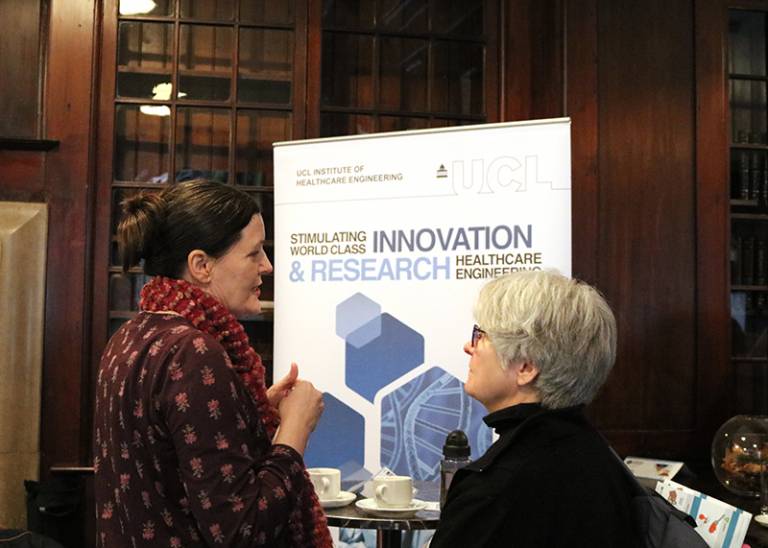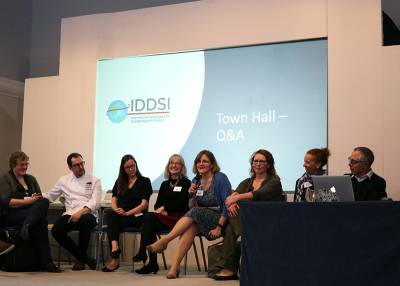IDDSI Congress 2019 – improving life for dysphagia patients
28 February 2019
With help from an IHE Workshop Award, Dr Ben Hanson, Senior Lecturer in Mechanical Engineering hosted the IDDSI Congress & Festival 2019.

On Monday 18 February, healthcare professionals, caterers, industry representatives, carers and patients gathered for the full-day conference in Bloomsbury. The day was an opportunity to see the immediate patient benefit of new guidelines for managing dysphagia – the medical term for swallowing problems – directly informed by UCL healthcare engineering research.
IDDSI (International Dysphagia Diet Standardisation Initiative) is a non-profit organisation that wants to improve the lives of people living with dysphagia. Dysphagia affects almost 600 million people worldwide, particularly older people and people with neurological conditions.
People with dysphagia and their carers need a safe, empirical way to test whether food is safe for them to eat – otherwise they run the risk of choking. Based on healthcare engineering research at UCL, IDDSI has developed a standardised way of testing and categorising different liquids and foods. All you need for the simple testing method is a ten-millimetre syringe and stopwatch. Food is then rated on a scale of 0-8 depending on how much flows out of the syringe in ten seconds. Food which is too thick to go into a syringe can be tested by seeing how it drips through the prongs of a fork.
Ben Hanson is an IDDSI Board Member. In his role at UCL, he researches the biomechanics of eating and drinking. Ben designed a mechanical simulator of a mouth and tongue which measured the pressure needed to swallow food. This research forms a key part of the IDDSI framework.
The IDDSI method has distinct benefits compared to the current ‘soft diet’ classification system. Firstly, the existing standards are open to interpretation and the descriptions are too simplistic to capture the range of possible food textures. The IDDSI framework is more rigorous and based on mechanical engineering principles. Secondly, the straight-forward, low-cost tools mean it can be used by anyone, anywhere in the world.
Peter Lam, IDDSI Co-Chair, and Ben were keen to emphasise that the IDDSI framework is not intended to replace clinical expertise. “IDDSI is all about standardisation of terminology and testing methods – not prescription. That is still the clinician’s decision”. They explained IDDSI’s main focus is to improve safety and quality of life for people with swallowing disorders.
Quality of life for people with dysphagia was a major theme throughout the day. We don’t just eat for survival but for enjoyment, and people with swallowing disorders shouldn’t be deprived of this.

The audience was treated to a live cooking demonstration by Preston Walker and James Ball from Oak House Kitchen. They showed the audience how to prepare delicious-tasting, attractive meals for people with swallowing disorders – like a deconstructed smoked salmon and beetroot sandwich and spaghetti bolognaise.

Swiss-based company Emotion Food Company has developed a food binding product, Easy-Base, which can be mixed with any food to modify its texture so that people with dysphagia can swallow it. This opens up endless possibilities and flavours for people who can often find their food options limited. Their company’s mission is to give the pleasure of eating back to dysphagia patients. Attendees sampled dysphagia-friendly chorizo, olives, goats’ cheese and even a strawberry tart.
We also heard from a number of clinicians who explained how the IDDSI framework is improving patient care. Alison Smith, British Dietetic Association (BDA) Ambassador said “If you have a choice between best guess and evidence, as a healthcare professional, you have to pick evidence. It boils down to safety”.

Mary Harrington, Head of Speech & Language Therapy at Hull University Teaching Hospitals, shared her experience of being an early adopter of the IDDSI framework. An important aspect of the rollout was raising awareness around dysphagia. Nine months on from starting the process, Mary says there is a markedly improved awareness of swallowing disorders in their hospitals.
IDDSI will be fully implemented in the UK healthcare system by April. The packed conference was evidence of the high level of enthusiasm for the new framework and an eagerness to improve patient care and quality of life. The event demonstrated how research can be directly applied to real life, and in instances like this, improve the lives of millions worldwide.
Ben Hanson was the recipient of an IHE Workshop Award which went towards funding this event. If you would like to find out more about this funding opportunity and apply, please see our funding page.
 Close
Close

